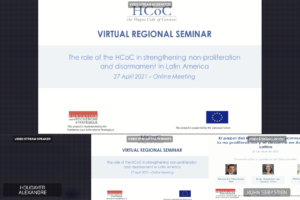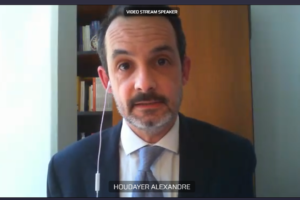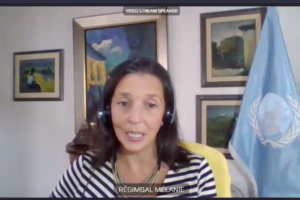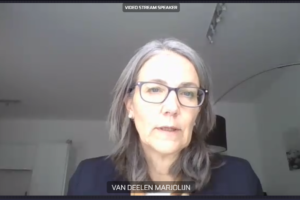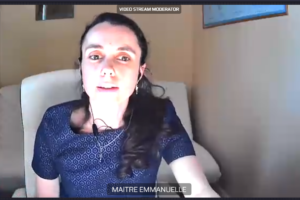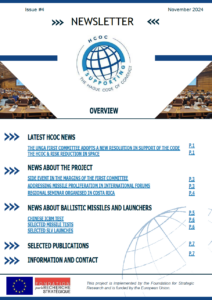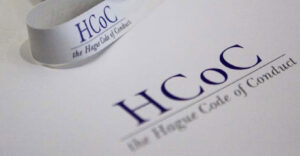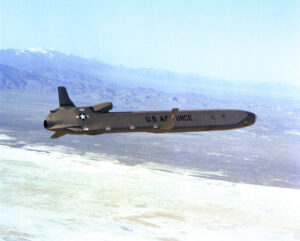Virtual seminar dedicated to Latin American countries
27 April 2021
Virtual
On 27 April 2021, the FRS organised a virtual seminar in Spanish and Portuguese dedicated to Latin American countries. Around 95 experts and diplomats participated to this event, representing a dozen of countries.
AGENDA
PRESENTATION & WELCOMING REMARKS
- Alexandre HOUDAYER, Secretary General, FRS
- Mélanie RÉGIMBAL, Director, United Nations Regional Centre for Peace, Disarmament and Development in Latin America (UNLIREC)
- Marjolijn VAN DEELEN, Special Envoy for Non-Proliferation and Disarmament, European External Action Service, European Union
I/ The HCoC: PRINCIPLES, FUNCTIONNING, CHALLENGES, BENEFITS
MODERATOR:
- Emmanuelle MAITRE, Research Fellow, FRS
PRESENTERS:
- Benno LAGGNER, Resident Representative to the IAEA, Permanent Representative to the CTBTO PrepCom, Permanent Mission of Switzerland, Vienna, Austria, HCoC Chair 2020-2021
- George-Wilhelm GALLHOFER, Minister, Representative of the HCoC Immediate Central Contact (ICC), Ministry of Foreign Affairs, Austria
- Alexandre HOUDAYER, Secretary General, FRS
KEY ISSUES:
- Contribution of the Code to international security
- Being a Subscribing State: commitments and benefits
- Day-to-day implementation of the Code
- What opportunities for Latin American countries in joining the Code? What constraints?
II/ LATIN AMERICAN PERSPECTIVES IN IMPLEMENTING DISARMAMENT & NON-PROLIFERATION INSTRUMENTS
MODERATOR:
- Alexandre HOUDAYER, Secretary General, FRS
PRESENTERS:
- Jorge LÓPEZ, Project Advisor, UNLIREC
- Soledad URRUELA ARENALES, UNSCR 1540 Coordinator, Inter-American Committee against Terrorism (CICTE), Organization of American States
- Natalia ZHURINA and Alain PONCE BLANCAS, Research Officers, OPANAL
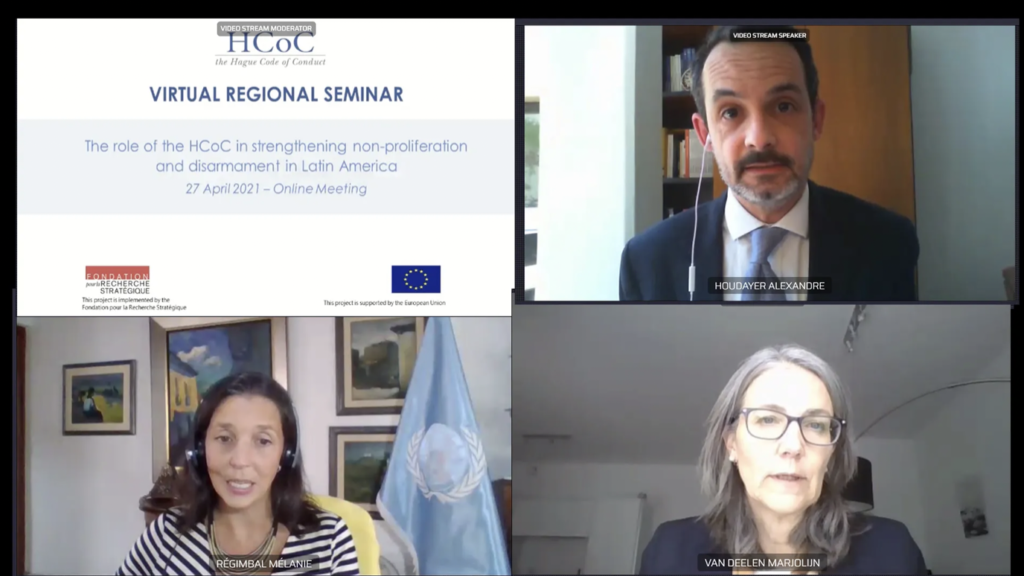
KEY ISSUES:
- Contribution of regional organizations in implementing WMD disarmament and nonproliferation instruments.
- Tools and assistance provided by regional organizations.
- Challenges and opportunities in regional implementation.
III/ BALLISTIC MISSILE PROLIFERATION & DUAL-USE ITEMS: CHALLENGES & OPPORTUNITIES LINKED TO LAUNCHING TECHNOLOGIES
MODERATOR:
- Jorge LÓPEZ, Project Advisor, UNLIREC
PRESENTERS:
- Emmanuelle MAITRE, Research Fellow, FRS
- Paul WOHRER, Research Fellow, FRS
KEY ISSUES:
- Main trends and challenges posed by ballistic proliferation today
- Assessment of tools and instruments existing to fight the proliferation of ballistic missiles, including the HCoC
- Role of the Code in promoting transparency in space
- From small sat to small launcher: recent trends in space development and consequence on the diffusion of dual-use technology
CONCLUSION
Summary of the debates
The aim of this virtual meeting was to present the HCoC, a modest yet effective tool against ballistic proliferation created to address this threat and to reduce the instability posed by existing arsenals. Ballistic missile proliferation continues to be a serious threat to international peace and security, as reaffirmed in several UN Security Council Resolutions. A real movement of support for the Code exists, as evidenced by the adoption every two years of resolutions at the UN General Assembly. The latest resolutions obtained a positive vote from more than 90% of Latin American states. Indeed, Latin America is a region that has a strong track record in favour of non-proliferation and disarmament. As such, a large majority of regional states also subscribe to the HCoC.
In opening the first panel, the principles of the Code were recalled. The HCoC aims to reduce the destabilising effects of ballistic missile activities through a set of transparency and confidence-building measures, without excluding states “from utilising the benefits of space for peaceful purposes”. With 143 current subscribing states, the HCoC, fills an important gap in the absence of legally-binding norms in this area. It enables privileged information exchange thereby enhancing trust-building and offers a platform to address issues linked to implementation and the broader dialogue on peace and security. Subscribing states must nominate a point of contact (who has access to the online platform), complete an annual declaration (a copy of which was shared with the participants) and pre-launch notifications (PLN) in case of a launch. Its administrative requirements are minimal, especially for states without ballistic or SLV programmes, and subscribing to the Code is free of charge. The Code is instrumental in mitigating perceived threats at the regional and international levels. It also contributes to avoiding ambiguities about the intention of neighbouring states through the mechanism of pre-launch notifications.
The second panel addressed the HCoC in the context of the multilateral non-proliferation and disarmament framework. Its objective was to show the links between the Code and other instruments, and to show the commitment of Latin American states in this regard. Panellists recalled the activities of UNLIREC to provide support to states in the implementation of their non-proliferation commitments, especially concerning the 1540 Resolution; the efforts deployed by the Inter-American Committee against Terrorism (CICTE) of the Organization of American States (OAS) to promote the implementation of the 1540 Resolution ; and the role of OPANAL, the organisation which monitors the implementation of the Treaty for the Prohibition Nuclear Weapons in Latin America and the Caribbean (Tlatelolco Treaty).
The last session aimed at presenting both the current dynamics regarding ballistic missile proliferation, dual-use items and dissemination of space launching technologies. Historical motivations for the acquisition of ballistic systems are the ability to carry WMD but also the prestige linked to these weapons and the ability to carry out strikes that are difficult to intercept and can lead to important physical and psychological damage. The role of the Code to promote the peaceful use of space was also mentioned. Current evolutions in the realm of space, including in Latin America, contribute to enabling access to space, but they could create uncertainty as the distinction between small solid-fuelled systems and big liquid-fuelled systems has begun to lose its pertinence. The increasing similarity between ballistic missiles and space launchers may add “noise” to a complex international environment. In this context, an instrument such as the HCoC may be very useful to ensure that all states can take advantage of the benefits of space in a transparent context.
